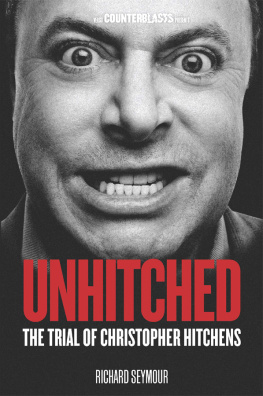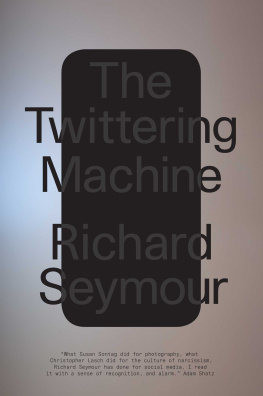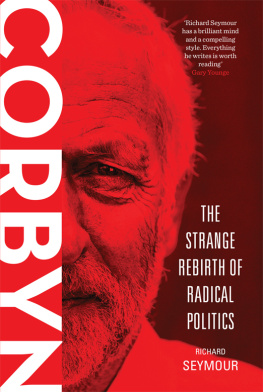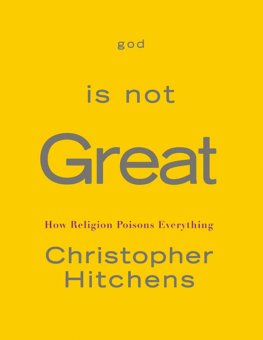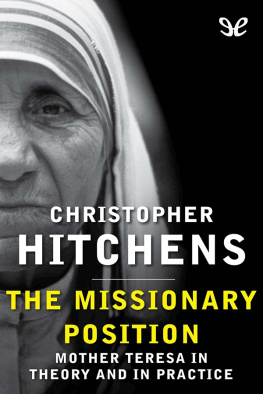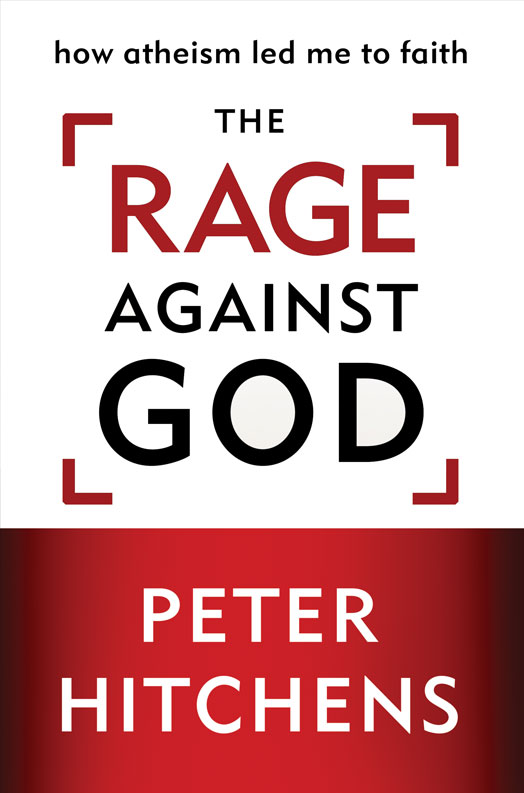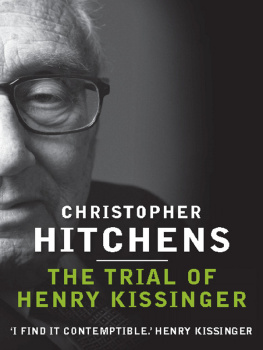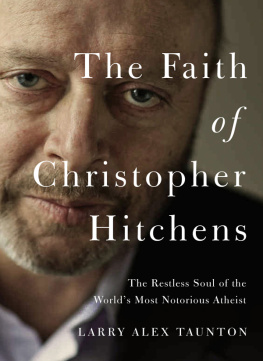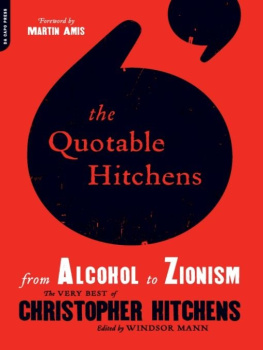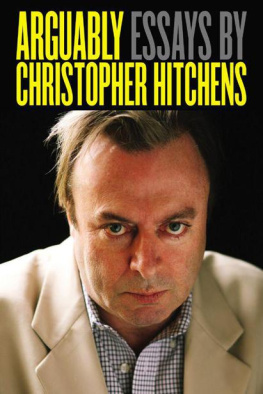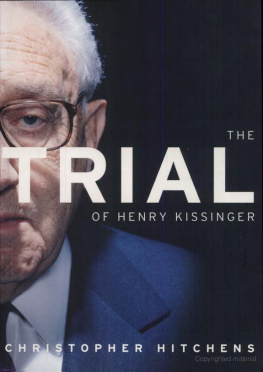

COUNTERBLASTS is a series of short, polemical titles that aims to revive a tradition inaugurated by Puritan and Leveller pamphleteers in the seventeenth century, when, in the words of one of their number, Gerard Winstanley, the old world was running up like parchment in the fire. From 1640 to 1663, a leading bookseller and publisher, George Thomason, recorded that his collection alone contained over twenty thousand pamphlets. Such polemics reappeared both before and during the French, Russian, Chinese, and Cuban revolutions of the last century.
In a period where politicians, media barons, and their ideological hirelings rarely challenge the basis of existing society, it is time to revive the tradition. Versos Counterblasts will challenge the apologists of Empire and Capital.
Unhitched: The Trial of
Christopher Hitchens
Richard Seymour

To Marie, whose hatred is pure. With all my love.
CONTENTS
I have never been able, except in my lazier moments, to employ the word predictable as a term of abuse Speaking purely for myself, I should be alarmed if my knee failed to respond to certain stimuli. It would warn me of a loss of nerve In the charmed circle of neoliberal and neoconservative journalism, however, unpredictability is the special emblem and certificate of self-congratulation. To be able to bray that as a liberal, I say bomb the shit out of them is to have achieved that eye-catching, versatile marketability that is so beloved of editors and talk-show hosts. As a life-long socialist, I say dont lets bomb the shit out of them. See what I mean? It lacks the sex appeal, somehow. Predictable as hell.
Christopher Hitchens, Blunt Instruments
If youre actually certain that youre hitting only a concentration of enemy troops [with cluster bombs] then its pretty good because those steel pellets will go straight through somebody and out the other side and through somebody else. And if theyre bearing a Koran over their heart, itll go straight through that, too. So they wont be able to say, Ah, I was bearing a Koran over my heart and guess what, the missile stopped halfway through. No way, cause itll go straight through that as well. Theyll be dead, in other words.
Christopher Hitchens to Adam Shatz in the Nation
In his benediction for Christopher Hitchens, who had just died from oesophageal cancer, the former British Prime Minister Tony Blair averred: He was a complete one-off in a world full of very stereotypical people, he was deeply unusual He was also a thoroughly decent person and if he thought a cause was right, took it up even if it wasnt popular, even if it brought him a certain amount of criticism.
None of this was entirely novel for Hitchens, who always made a virtue of his contradictory stances. Hitchenss story was, then, not exactly that of a noble mind overthrown, even if there was some form of regime change after the Twin Towers collapsed. Rather, the elements of his peculiar political personality were displaced, shaken up by events, and recomposed in a new articulation that leaned heavily to the right. Where once his career-minded avarice and desire for recognition from the rich and powerful coexisted with socialist commitment (hence the affectionate nickname Hypocritchens that he acquired at Oxford), his ambition was soon satisfied by unpredictable and lucrative opinions of the sort he had once satirised. By 2010 he could boast: Ive made more money than I ever thought I would. Ive got more readers than I ever thought I would, and more esteem.
Hitchens had ceased to call himself a socialist by the time he was moved to say, in effect, Lets bomb the shit out of them. In a November 2001 interview with Reason magazine he renounced any belief in the existence of a general socialist critique of capitalism certainly not the sort of critique that proposes an alternative or a replacement. Yet until his full debut as the George W. Bush administrations amanuensis, Hitchens still identified himself in some sense as a man of the left. And even for some interval following his decision to back Bush, Hitchens did not fully renounce his affiliation. Much of the gasp factor in his malediction of the antiwar left derived from his repeated claim that as a lifelong socialist he was calling for cluster bombs in Kabul.
There has to be a stand made against the worst kind of tyranny that there ever could be, which is religious You couldnt really have wanted a better and more dynamic and radical confrontation. And the American left decides: Lets sit this one out. Thats historical condemnation. To be neutral or indifferent about that, its just giving up. You just want a quiet life I still think as an internationalist and as a socialist in what you might call the intellectual, the ethical way I still do. And I accept also the risks of revolutionary strategy even if its only a revolution from above.
Predictably unpredictable, then, Hitchenss war against clich ended in a clich: he was for bombing them after all. Moreover, Hitchenss stance held a tendency towards the moral knight-errantry that Alasdair MacIntyre had detected in an earlier strain of ex-Communist.
Of course, Hitchens had never been a member of a Communist Party, far less the victim of a Stalinist regime. He was, first of all, a left-wing member of the Labour Party until he was expelled because of his activism against the Vietnam War (196567). Then for about seven years he was an International Socialist (196774), then a member of the Labour Party most likely until his move to the United States (197581), and for the majority of his remaining time on the left he was a member of no party or tendency. The sociological basis, as it were, for his leftism was the radical intelligentsia. His main point of contact with these informal circuits in the United States had been Alexander Cockburn, the son of Claud Cockburn, the radical British journalist; as a radical migr writer in the United States, the younger Cockburn was something of a paragon for the young Hitchens. But once Hitchens was established, he could be said to have had no particular dependency on anyone of the left, and only his employers the Nation , London Review of Books , Verso Books, Vanity Fair from the early 1990s, and other occasional patrons in the newspaper and television circuit had any possible hold over him. So when Hitchens spoke of casting aside his chains of political and ideological fealty, these were the chains of leftist conscience rather than organisational or institutional binds.
Nonetheless, it was very important for him to represent his stance as precisely an affirmation of that conscience. And since Hitchens was not joined in his defection by any major faction of the left, either in the United States or elsewhere, this necessarily entailed the suggestion that power had corrupted almost the entirety of the left, which had purchased its plot in the status quo and was anxious to preserve it. In Hitchenss account of his life and writing, he was always one step ahead of the fools.
Other tendencies did manifest themselves. One, which MacIntyre also identified, was to substitute one group affiliation for another from class struggle to religion, say, or country or race. In Hitchenss case amor patriae took the place of socialist confraternity. Likewise, the old habits of a certain kind of vulgar historicism came to Hitchenss aid. This is extremely important in understanding Hitchenss unique political psychology. For one of the things that he often meant by Marxism was a sense of history as a narrative of progress. In Hitchenss hands this was rather crude and mechanistic, and tended to express contempt for those on the losing side. As Adam Shatz, a former colleague at the Nation , explained:
Next page
